Gibbs' Model Reflection: Cultural Safety in Nursing Practice Essay
VerifiedAdded on 2023/04/07
|5
|986
|346
Essay
AI Summary
This nursing reflective essay utilizes Gibbs' Reflective Cycle to analyze a personal learning experience related to the importance of culture among Aboriginal and Torres Strait Islander peoples. It delves into the understanding of their physical well-being, encompassing social, emotional, and cultural dimensions, and emphasizes the significance of cultural awareness in addressing health issues. The reflection explores feelings of compassion and the importance of respecting cultural values in healthcare. It evaluates the author's skills and knowledge in promoting positive behaviors and attitudes towards Aboriginal and Torres Strait Islander health, concluding that cultural understanding is a critical determinant of healthcare outcomes and highlighting the need for culturally sensitive resource planning and allocation in future nursing practice to reduce healthcare disparities.
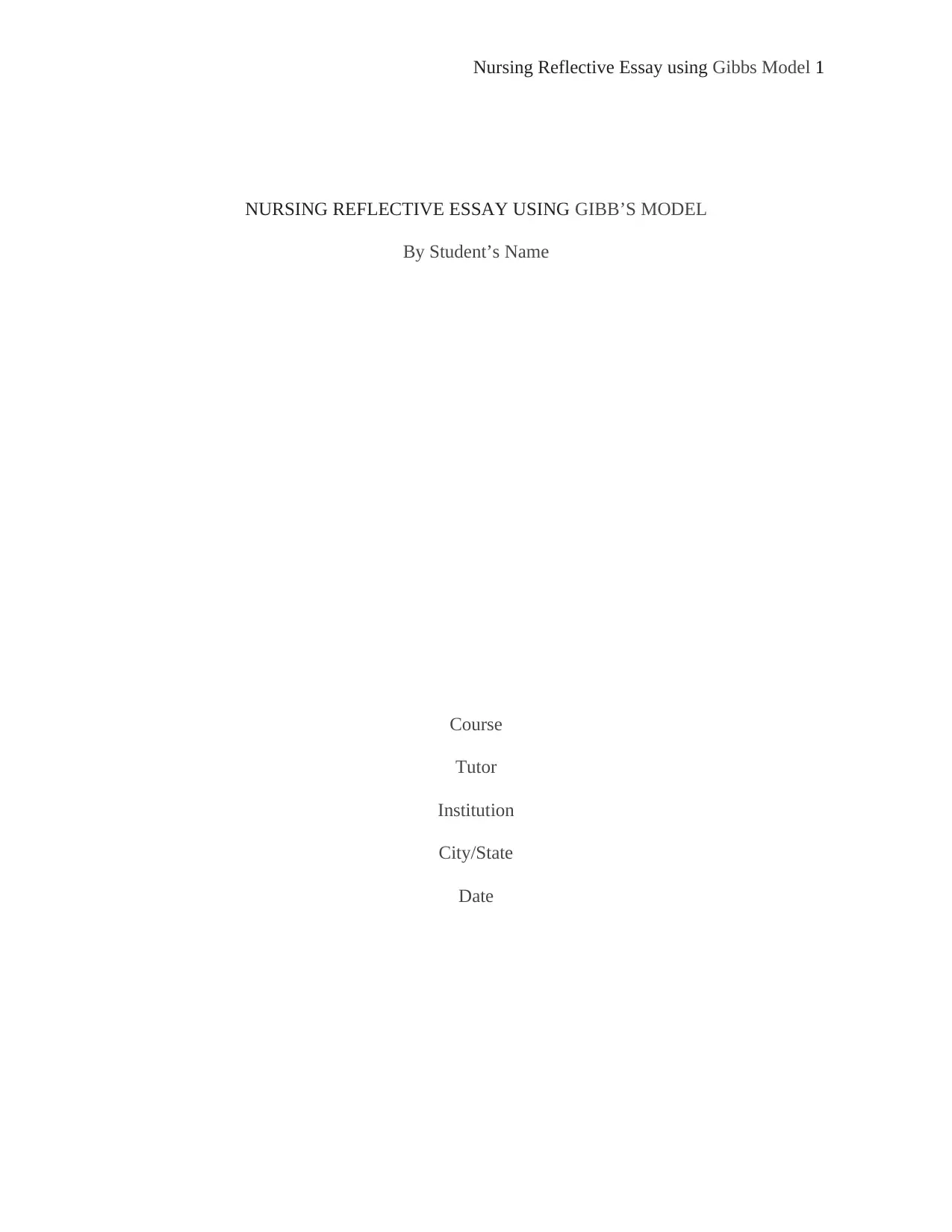
Nursing Reflective Essay using Gibbs Model 1
NURSING REFLECTIVE ESSAY USING GIBB’S MODEL
By Student’s Name
Course
Tutor
Institution
City/State
Date
NURSING REFLECTIVE ESSAY USING GIBB’S MODEL
By Student’s Name
Course
Tutor
Institution
City/State
Date
Paraphrase This Document
Need a fresh take? Get an instant paraphrase of this document with our AI Paraphraser
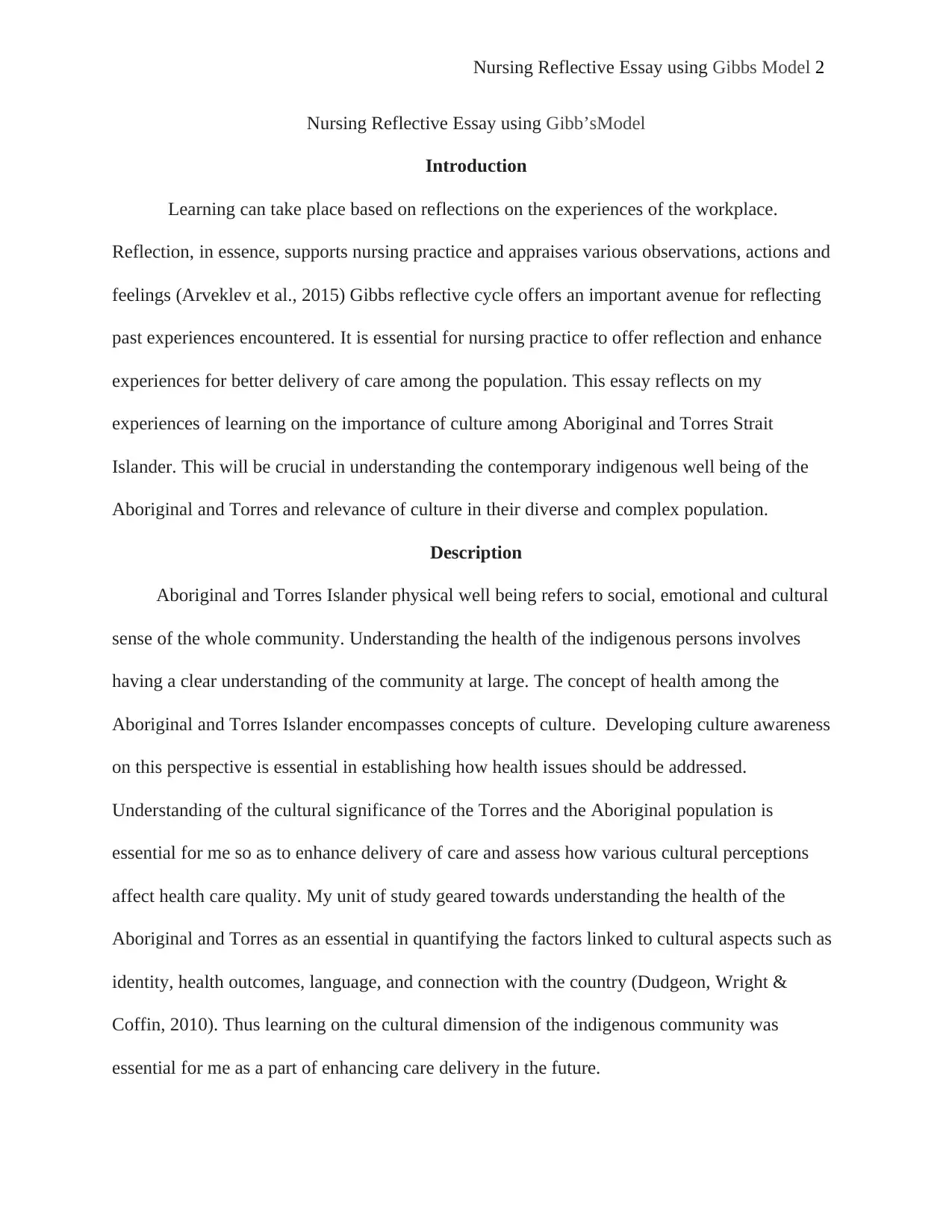
Nursing Reflective Essay using Gibbs Model 2
Nursing Reflective Essay using Gibb’sModel
Introduction
Learning can take place based on reflections on the experiences of the workplace.
Reflection, in essence, supports nursing practice and appraises various observations, actions and
feelings (Arveklev et al., 2015) Gibbs reflective cycle offers an important avenue for reflecting
past experiences encountered. It is essential for nursing practice to offer reflection and enhance
experiences for better delivery of care among the population. This essay reflects on my
experiences of learning on the importance of culture among Aboriginal and Torres Strait
Islander. This will be crucial in understanding the contemporary indigenous well being of the
Aboriginal and Torres and relevance of culture in their diverse and complex population.
Description
Aboriginal and Torres Islander physical well being refers to social, emotional and cultural
sense of the whole community. Understanding the health of the indigenous persons involves
having a clear understanding of the community at large. The concept of health among the
Aboriginal and Torres Islander encompasses concepts of culture. Developing culture awareness
on this perspective is essential in establishing how health issues should be addressed.
Understanding of the cultural significance of the Torres and the Aboriginal population is
essential for me so as to enhance delivery of care and assess how various cultural perceptions
affect health care quality. My unit of study geared towards understanding the health of the
Aboriginal and Torres as an essential in quantifying the factors linked to cultural aspects such as
identity, health outcomes, language, and connection with the country (Dudgeon, Wright &
Coffin, 2010). Thus learning on the cultural dimension of the indigenous community was
essential for me as a part of enhancing care delivery in the future.
Nursing Reflective Essay using Gibb’sModel
Introduction
Learning can take place based on reflections on the experiences of the workplace.
Reflection, in essence, supports nursing practice and appraises various observations, actions and
feelings (Arveklev et al., 2015) Gibbs reflective cycle offers an important avenue for reflecting
past experiences encountered. It is essential for nursing practice to offer reflection and enhance
experiences for better delivery of care among the population. This essay reflects on my
experiences of learning on the importance of culture among Aboriginal and Torres Strait
Islander. This will be crucial in understanding the contemporary indigenous well being of the
Aboriginal and Torres and relevance of culture in their diverse and complex population.
Description
Aboriginal and Torres Islander physical well being refers to social, emotional and cultural
sense of the whole community. Understanding the health of the indigenous persons involves
having a clear understanding of the community at large. The concept of health among the
Aboriginal and Torres Islander encompasses concepts of culture. Developing culture awareness
on this perspective is essential in establishing how health issues should be addressed.
Understanding of the cultural significance of the Torres and the Aboriginal population is
essential for me so as to enhance delivery of care and assess how various cultural perceptions
affect health care quality. My unit of study geared towards understanding the health of the
Aboriginal and Torres as an essential in quantifying the factors linked to cultural aspects such as
identity, health outcomes, language, and connection with the country (Dudgeon, Wright &
Coffin, 2010). Thus learning on the cultural dimension of the indigenous community was
essential for me as a part of enhancing care delivery in the future.
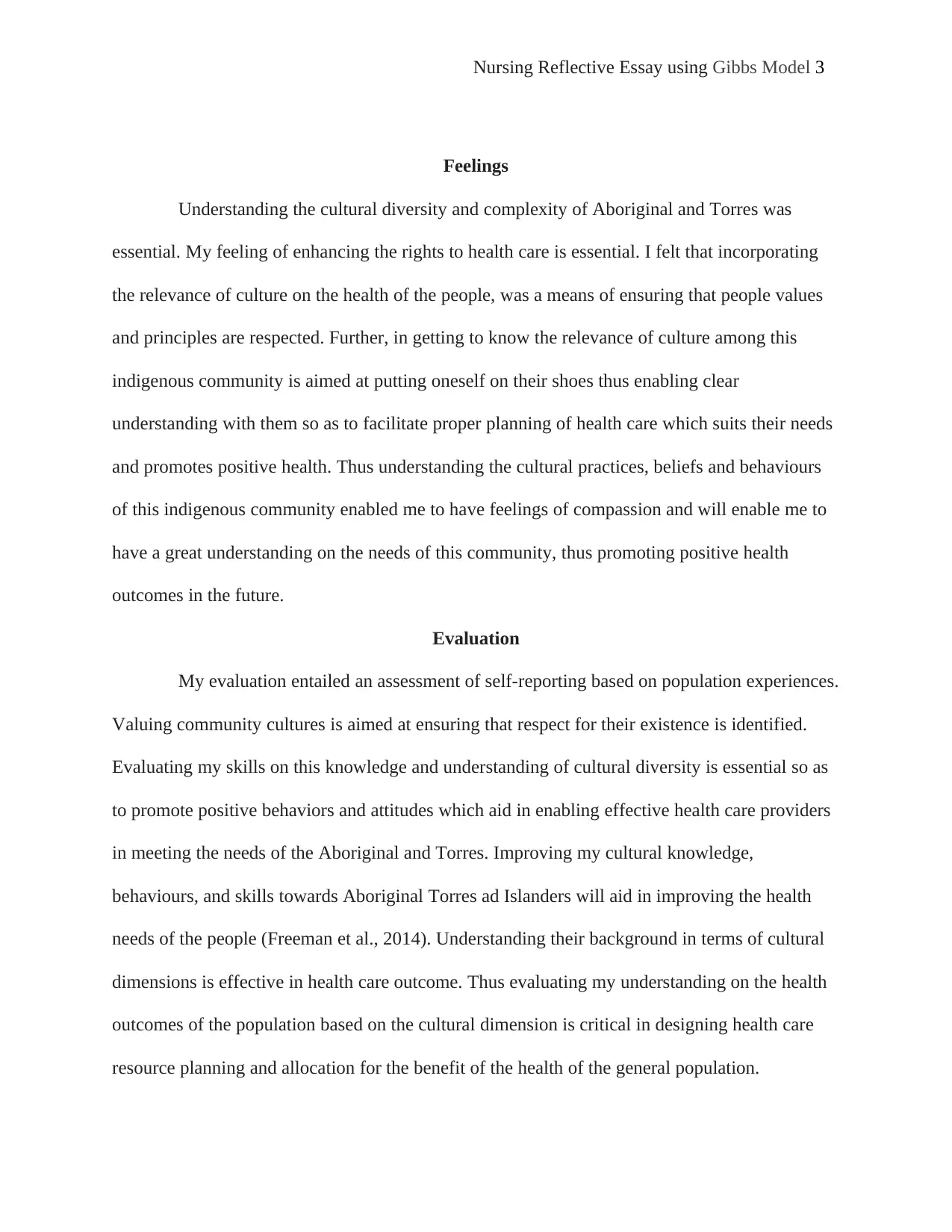
Nursing Reflective Essay using Gibbs Model 3
Feelings
Understanding the cultural diversity and complexity of Aboriginal and Torres was
essential. My feeling of enhancing the rights to health care is essential. I felt that incorporating
the relevance of culture on the health of the people, was a means of ensuring that people values
and principles are respected. Further, in getting to know the relevance of culture among this
indigenous community is aimed at putting oneself on their shoes thus enabling clear
understanding with them so as to facilitate proper planning of health care which suits their needs
and promotes positive health. Thus understanding the cultural practices, beliefs and behaviours
of this indigenous community enabled me to have feelings of compassion and will enable me to
have a great understanding on the needs of this community, thus promoting positive health
outcomes in the future.
Evaluation
My evaluation entailed an assessment of self-reporting based on population experiences.
Valuing community cultures is aimed at ensuring that respect for their existence is identified.
Evaluating my skills on this knowledge and understanding of cultural diversity is essential so as
to promote positive behaviors and attitudes which aid in enabling effective health care providers
in meeting the needs of the Aboriginal and Torres. Improving my cultural knowledge,
behaviours, and skills towards Aboriginal Torres ad Islanders will aid in improving the health
needs of the people (Freeman et al., 2014). Understanding their background in terms of cultural
dimensions is effective in health care outcome. Thus evaluating my understanding on the health
outcomes of the population based on the cultural dimension is critical in designing health care
resource planning and allocation for the benefit of the health of the general population.
Feelings
Understanding the cultural diversity and complexity of Aboriginal and Torres was
essential. My feeling of enhancing the rights to health care is essential. I felt that incorporating
the relevance of culture on the health of the people, was a means of ensuring that people values
and principles are respected. Further, in getting to know the relevance of culture among this
indigenous community is aimed at putting oneself on their shoes thus enabling clear
understanding with them so as to facilitate proper planning of health care which suits their needs
and promotes positive health. Thus understanding the cultural practices, beliefs and behaviours
of this indigenous community enabled me to have feelings of compassion and will enable me to
have a great understanding on the needs of this community, thus promoting positive health
outcomes in the future.
Evaluation
My evaluation entailed an assessment of self-reporting based on population experiences.
Valuing community cultures is aimed at ensuring that respect for their existence is identified.
Evaluating my skills on this knowledge and understanding of cultural diversity is essential so as
to promote positive behaviors and attitudes which aid in enabling effective health care providers
in meeting the needs of the Aboriginal and Torres. Improving my cultural knowledge,
behaviours, and skills towards Aboriginal Torres ad Islanders will aid in improving the health
needs of the people (Freeman et al., 2014). Understanding their background in terms of cultural
dimensions is effective in health care outcome. Thus evaluating my understanding on the health
outcomes of the population based on the cultural dimension is critical in designing health care
resource planning and allocation for the benefit of the health of the general population.
⊘ This is a preview!⊘
Do you want full access?
Subscribe today to unlock all pages.

Trusted by 1+ million students worldwide
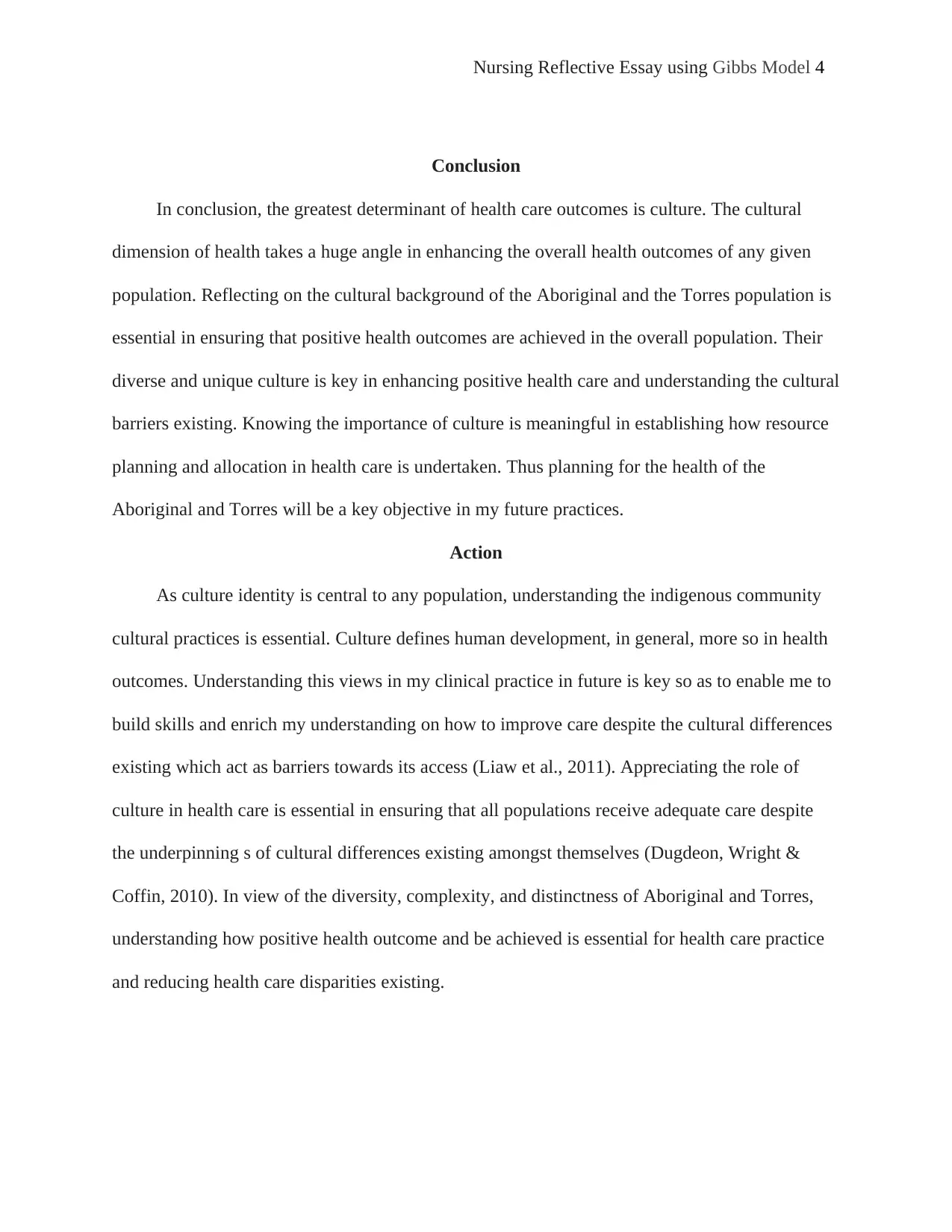
Nursing Reflective Essay using Gibbs Model 4
Conclusion
In conclusion, the greatest determinant of health care outcomes is culture. The cultural
dimension of health takes a huge angle in enhancing the overall health outcomes of any given
population. Reflecting on the cultural background of the Aboriginal and the Torres population is
essential in ensuring that positive health outcomes are achieved in the overall population. Their
diverse and unique culture is key in enhancing positive health care and understanding the cultural
barriers existing. Knowing the importance of culture is meaningful in establishing how resource
planning and allocation in health care is undertaken. Thus planning for the health of the
Aboriginal and Torres will be a key objective in my future practices.
Action
As culture identity is central to any population, understanding the indigenous community
cultural practices is essential. Culture defines human development, in general, more so in health
outcomes. Understanding this views in my clinical practice in future is key so as to enable me to
build skills and enrich my understanding on how to improve care despite the cultural differences
existing which act as barriers towards its access (Liaw et al., 2011). Appreciating the role of
culture in health care is essential in ensuring that all populations receive adequate care despite
the underpinning s of cultural differences existing amongst themselves (Dugdeon, Wright &
Coffin, 2010). In view of the diversity, complexity, and distinctness of Aboriginal and Torres,
understanding how positive health outcome and be achieved is essential for health care practice
and reducing health care disparities existing.
Conclusion
In conclusion, the greatest determinant of health care outcomes is culture. The cultural
dimension of health takes a huge angle in enhancing the overall health outcomes of any given
population. Reflecting on the cultural background of the Aboriginal and the Torres population is
essential in ensuring that positive health outcomes are achieved in the overall population. Their
diverse and unique culture is key in enhancing positive health care and understanding the cultural
barriers existing. Knowing the importance of culture is meaningful in establishing how resource
planning and allocation in health care is undertaken. Thus planning for the health of the
Aboriginal and Torres will be a key objective in my future practices.
Action
As culture identity is central to any population, understanding the indigenous community
cultural practices is essential. Culture defines human development, in general, more so in health
outcomes. Understanding this views in my clinical practice in future is key so as to enable me to
build skills and enrich my understanding on how to improve care despite the cultural differences
existing which act as barriers towards its access (Liaw et al., 2011). Appreciating the role of
culture in health care is essential in ensuring that all populations receive adequate care despite
the underpinning s of cultural differences existing amongst themselves (Dugdeon, Wright &
Coffin, 2010). In view of the diversity, complexity, and distinctness of Aboriginal and Torres,
understanding how positive health outcome and be achieved is essential for health care practice
and reducing health care disparities existing.
Paraphrase This Document
Need a fresh take? Get an instant paraphrase of this document with our AI Paraphraser
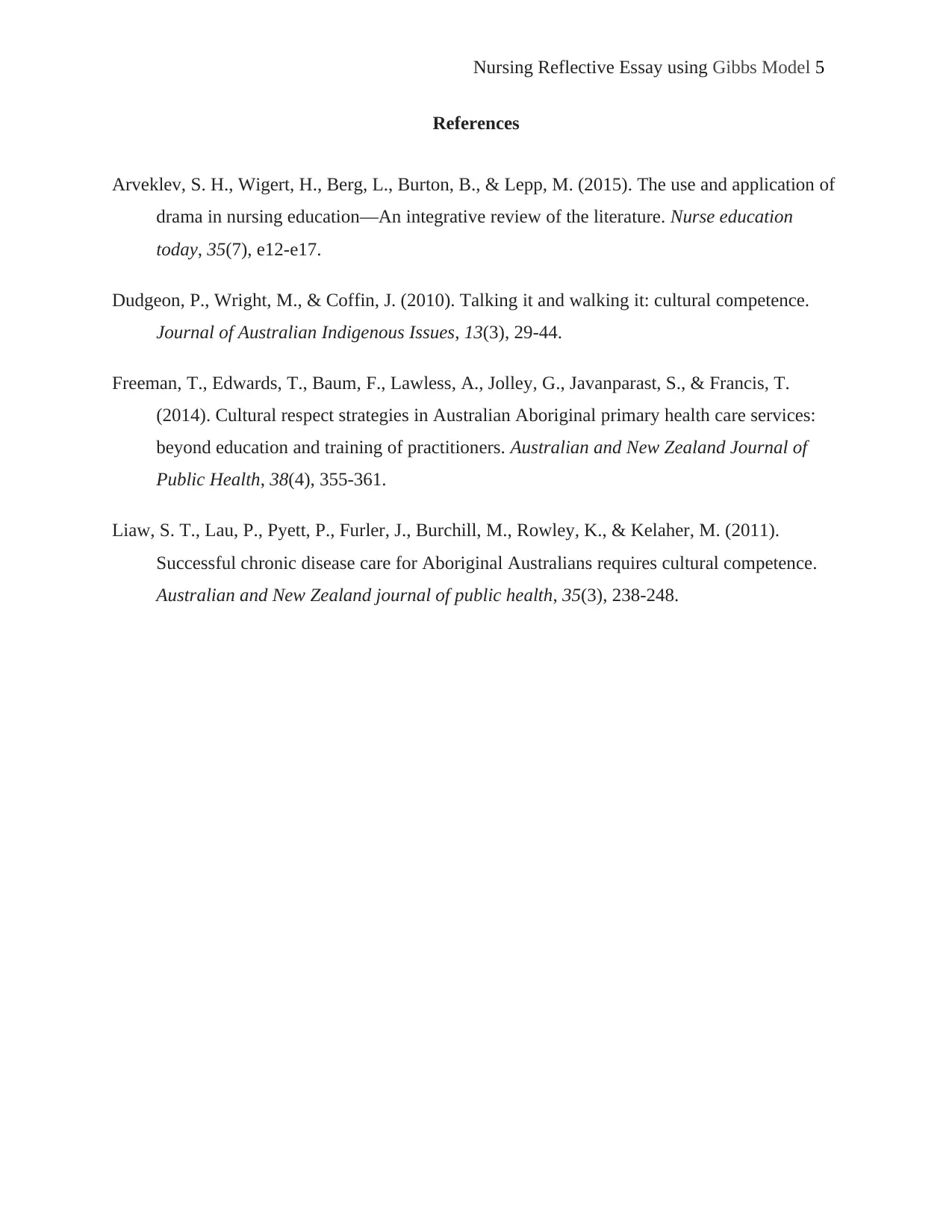
Nursing Reflective Essay using Gibbs Model 5
References
Arveklev, S. H., Wigert, H., Berg, L., Burton, B., & Lepp, M. (2015). The use and application of
drama in nursing education—An integrative review of the literature. Nurse education
today, 35(7), e12-e17.
Dudgeon, P., Wright, M., & Coffin, J. (2010). Talking it and walking it: cultural competence.
Journal of Australian Indigenous Issues, 13(3), 29-44.
Freeman, T., Edwards, T., Baum, F., Lawless, A., Jolley, G., Javanparast, S., & Francis, T.
(2014). Cultural respect strategies in Australian Aboriginal primary health care services:
beyond education and training of practitioners. Australian and New Zealand Journal of
Public Health, 38(4), 355-361.
Liaw, S. T., Lau, P., Pyett, P., Furler, J., Burchill, M., Rowley, K., & Kelaher, M. (2011).
Successful chronic disease care for Aboriginal Australians requires cultural competence.
Australian and New Zealand journal of public health, 35(3), 238-248.
References
Arveklev, S. H., Wigert, H., Berg, L., Burton, B., & Lepp, M. (2015). The use and application of
drama in nursing education—An integrative review of the literature. Nurse education
today, 35(7), e12-e17.
Dudgeon, P., Wright, M., & Coffin, J. (2010). Talking it and walking it: cultural competence.
Journal of Australian Indigenous Issues, 13(3), 29-44.
Freeman, T., Edwards, T., Baum, F., Lawless, A., Jolley, G., Javanparast, S., & Francis, T.
(2014). Cultural respect strategies in Australian Aboriginal primary health care services:
beyond education and training of practitioners. Australian and New Zealand Journal of
Public Health, 38(4), 355-361.
Liaw, S. T., Lau, P., Pyett, P., Furler, J., Burchill, M., Rowley, K., & Kelaher, M. (2011).
Successful chronic disease care for Aboriginal Australians requires cultural competence.
Australian and New Zealand journal of public health, 35(3), 238-248.
1 out of 5
Related Documents
Your All-in-One AI-Powered Toolkit for Academic Success.
+13062052269
info@desklib.com
Available 24*7 on WhatsApp / Email
![[object Object]](/_next/static/media/star-bottom.7253800d.svg)
Unlock your academic potential
Copyright © 2020–2025 A2Z Services. All Rights Reserved. Developed and managed by ZUCOL.





